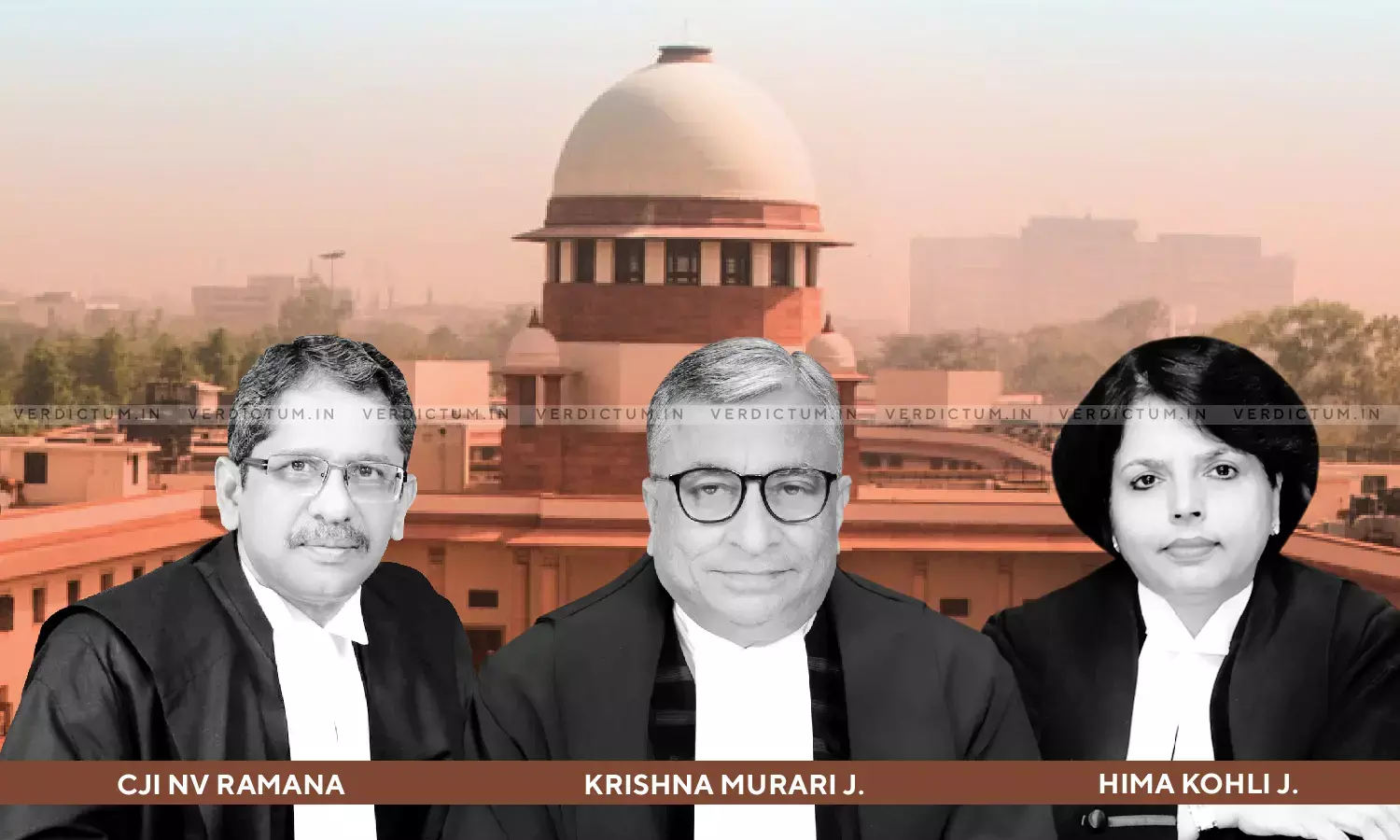Nature Of Crime, Criminal History Not Considered By High Court - SC Reverses HC's Order Granting Bail
A three-judge bench of CJI N. V. Ramana, Justice Krishna Murari and Justice Hima Kohli set aside the bail application issued by the High Court to the Accused in a Murder Trial and elucidated in great detail the extent of the power of the High Court to grant bail and the factors determining the nature and gravity of crime to be considered before granting bail to an accused.
The Bench while reversing the order of the High Court granting bail held -
"The High Court has not taken into consideration the criminal history of the Respondent No.2/Accused, nature of crime, material evidences available, involvement of Respondent No.2/Accused in the said crime and recovery of weapon from his possession."
Facts & History of the Case
Respondent No. 2 is an accused in a Murder Trial. The Respondent filed for Bail before the Session Judge at Lucknow, the same being rejected due to the Respondent being named by the Deceased(Victim) himself.
The Respondent then moved High Court seeking regular bail, with the contention that the co-accused was already granted bail by the High Court. Relying on the dictum of the Apex Court in Dataram Singh vs. State of U.P & Anr., the Bail application was allowed by the High Court.
Aggrieved by this decision of the High Court, the Appellant has approached the Supreme Court.
Issue – Whether the High Court was justified in exercising jurisdiction under Section 439(1) of the Cr.P.C for grant of regular bail.
Mr. Awanish Sinha, Counsel appearing for the Appellant submitted before the court that the Accused having criminal antecedents and being named by the Deceased himself cannot be granted bail merely on the ground of parity. It was also argued that the Accused was named in the FIR as the person that had fired at the Deceased causing his untimely death. Further, Mr. Sinha submitted that High Court granted bail to the Accused on the very first day of being listed without giving the State or the Appellant an opportunity to respond/file counter.
Mr. Siddharth Dave, Senior Counsel appearing for Respondent No. 2 denying the allegations made as to the existence of criminal antecedents, argued that granting bail on the very first day of listing was not in contravention of any statutory provision or precedent.
The Bench observed that the following factors were to be considered before granting bail to an Accused -
A. Principles Governing Grant of Bail
Section 439 of Cr.P.C to be the guiding principle for adjudicating Regular Bail Applications. Relying on Prahlad Singh Bhati Vs. NCT of Delhi And Another the court laid down that the Jurisdiction to grant bail is to be exercised on the basis of well-established principles, depending on the facts and circumstances of the case.
The Bench also made a reference to Prasanta Kumar Sarkar Vs. Ashish Chatterjee And Another wherein factors to be borne in mind while considering a bail application like nature and gravity of accusation, the severity of punishment if convicted, the likelihood of the offence being repeated, and the danger of justice being thwarted by grant of bail, etc., were established.
B. Recording reasons for grant of bail by the High Court of the Session Court
In this context, the Bench observed that – "The importance of assigning reasoning for grant or denial of bail can never be undermined. There is prima facie need to indicate reasons particularly in cases of grant or denial of bail where the accused is charged with a serious offence"
The Bench reiterated the principle laid down in Ramesh Bhavan Rathod Vs. Vishanbhai Hirabhai Makwana(Koli) & Another, that the duty of the Court to record reasons is a safeguard that ensures that the discretion of the court, is exercised in a judicious manner and that the court cannot deviate from its duty to apply a judicial mind.
C. Cancellation of Bail
The Bench expressed that – "that bail once granted, should not be cancelled in a mechanical manner without considering whether any supervening circumstances have rendered it no longer conducive to a fair trial"
Reference was made to Dolat Ram and Others vs. State of Haryana which laid down the grounds for cancellation of bail including, but not limited to – possibility of accused absconding, the likelihood of misuse of bail, evasion or attempt to evade the due course of justice and abuse of bail once it is granted.
Further, the Bench held that the following circumstances can also be considered for cancellation of bail –
a) Where the court granting bail takes into account irrelevant material of substantial nature and not trivial nature while ignoring relevant material on record.
b) Where the court granting bail overlooks the influential position of the accused in comparison to the victim of abuse or the witnesses especially when there is prima facie misuse of position and power over the victim
c) Where the past criminal record and conduct of the accused is completely ignored while granting bail.
d) Where bail has been granted on untenable grounds etc.."
Held
In view of the above, the Bench opined that the grant of bail merely on the basis of parity shows that the High Court has not taken into account the criminal history of the Respondent, nature of the crime, material evidences, and recovery of weapon from the possession of the Respondent.
Consequently, the order passed by the High Court was found to be unsustainable and thereby set aside and the appeal was allowed.
Click here to read/download the Judgment




